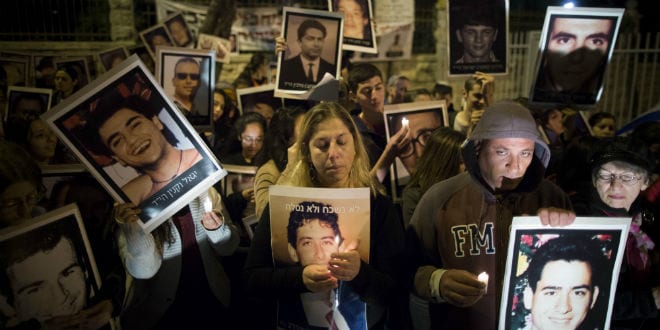
In a turnaround on last week’s delayed vote, a bill which would allow judges to prevent convicted terrorists from being released in future prisoner exchanges or peace deals passed another hurdle. On Sunday, the Israeli cabinet rejected an appeal to have the bill struck down. It is now expected to come before the Knesset in the coming days for a preliminary reading.
The bill, sponsored by MKs Ayelet Shaked (Jewish Home), Yariv Levin (Likud), David Tzur (Hatnua) and others, was first proposed in December, but faced legal challenges by the Attorney General over its wording. Then last month, it passed a landslide vote in Ministerial Committee, only to be vetoed by Science Minister Yaakov Perry (Yesh Atid).
Last Sunday, the bill was supposed to be read in Knesset, but Prime Minister Benjamin Netanyahu took it off the agenda at the last minute, promising instead to put it up for discussion before the Diplomacy and Security Cabinet within the week.
Jewish Home chairman Naftali Bennett celebrated the perceived victory via Facebook. “This moment, the government approved the law against releasing terrorists,” Bennett wrote. “Today, we end the ‘murder deal’ – a deal which exists only in Israel. Under the new law, [terrorists convicted of] serious acts of murder could see the judge give them a life sentence without the possibility of parole.” He deemed the bill a “Zionist response” to the recent formation of a “Palestinian unity government of terror.”
“If the State of Israel doesn’t back the simple morality that murderers need to die in jail, from this moment there won’t be any choice,” he said, explaining the intention of the bill.

The Jewish Home party vehemently opposed the release of nearly 80 prisoners, many with blood on their hands, as part of the failed peace talks which began last summer. The last round of prisoner releases was cancelled after the Palestinian Authority made a bid for UN recognition in contradiction to commitments it had made earlier. All told, 104 prisoners were supposed to be released in the arrangement. This bill would prevent certain terrorists from qualifying for release in future deals.
The bill faced strenuous debate in the cabinet meeting, as some ministers felt it tied the government’s hands. If it passes into law, it would change the current Basic Law of the President of the State, which gives the president the power to pardon any prisoner.
The bill, which will not apply retroactively, would allow judges, at the time of sentencing, to include a clause precluding the prisoner’s pardon for certain heinous crimes, including nationalist murders or terrorist activities.




